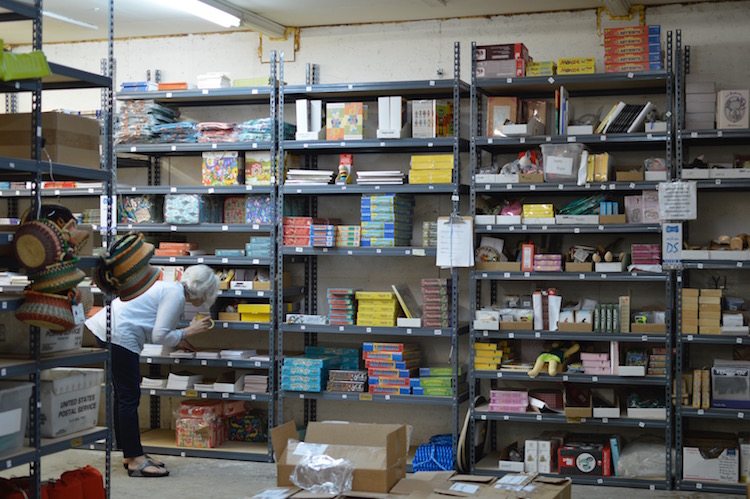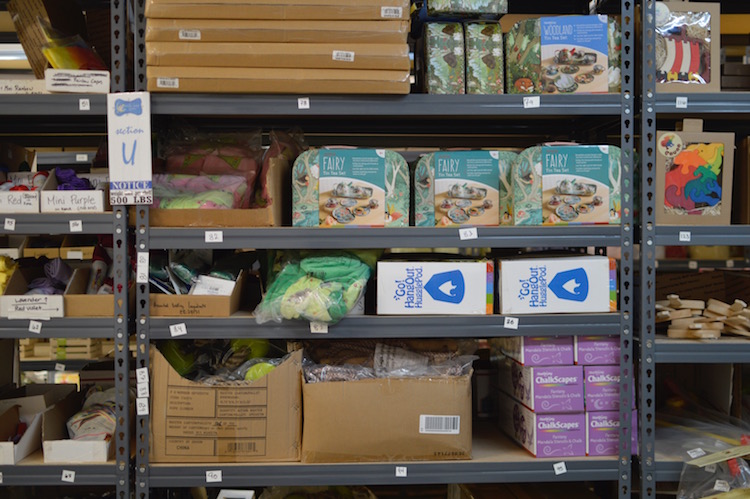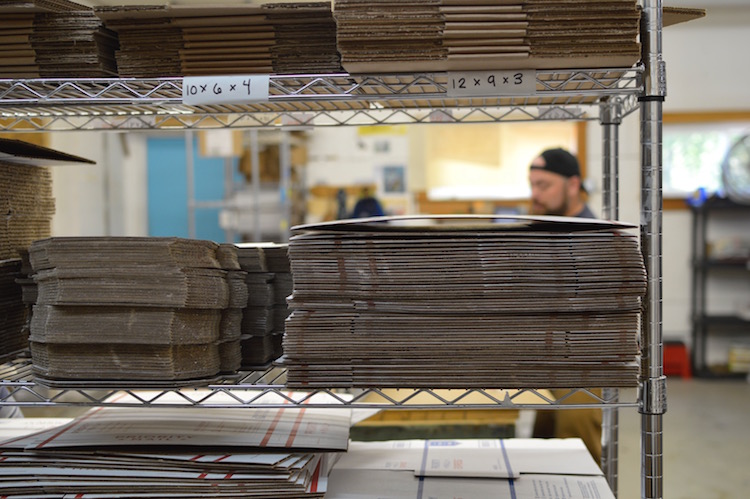Between Bella Luna Toys and Oompa Toys, there are over 1,800 SKUs in the warehouse. When I ask Chris, the Warehouse Manager in charge for some of the warehouse stats, he can rattle them off instantly.
Biggest shipping day? “525 orders.”
Craziest time of year? “October through December, though August is getting busier and busier.”
How quickly does an order get printed and packed? “Around 6 minutes, but I’d love to get that down to 4 minutes.”
Chris has a deep-rooted knowledge of the inner workings of the warehouse, but also of the business overall. These extra skills are part of what makes a good warehouse manager, according to the owner Sarah Baldwin. “Chris isn’t just good – he’s great,” she says.
Here’s a list of warehouse manager skills to look for when you’re ready to hire your own.
Know The Product As Well As The Owner

Chris’ working knowledge of the products is so strong that Sarah also leans on him for help with inventory buying and forecasting, which is not part of the average warehouse manager’s job description. Sarah insists he knows the assortment as well as she does.
“I wouldn’t go that far,” says Chris. “Sarah obviously knows the products much better than I do!”
“He’s good to bounce ideas off now when I’m ordering,” she says. “Although we didn’t agree on some little bearded gnomes recently.”
Chris’ background is in manufacturing, so the fact that he now knows the difference between the Organic Schatzi Doll and the Organic Schnookie Doll says a lot about his commitment to the company.
This is a hard quality to measure for in the hiring process, so ask a candidate detailed questions about the company they currently work for. The more they know, the more likely they are to be invested in your business.
Be A Little Nutso About Processes

When Sarah remembers how her warehouse was first laid out, it would probably make any warehouse supervisor cringe. “I would get a box of inventory in and just shove it onto a shelf. That was the system,” she said.
Chris wasn’t deterred by the lack of systems in place when he took the job and happily jumped in to create new processes. He’s been in charge of everything from shipping to binning and always has input for company wide improvements. He’s also not afraid to be flexible about finding new ways of doing things. “I was used to binning by material in my last job but doing it by company here has been crucial for keeping things in order.”
Being a process-oriented person is probably the biggest thing a warehouse manager must have.
Being a process-oriented person is probably the biggest thing a warehouse manager must have. It’s important to ask a potential warehouse manager what new systems they put in place at their current job. You want someone that is always looking to improve upon how things can run more efficiently, not just someone comfortable with being a cog in the wheel.
Be Quick to Adapt During Peak Times

There have been moments when the warehouse has felt too small. Even now, Chris thinks they will outgrow the space sooner rather than later. In the early days of Bella Luna, they used all kinds of tricks to accommodate their growing inventory.
“There was a time when we had a storage pod in the parking lot and during one holiday season we used an area of the building that wasn’t ‘technically’ ours,” says Chris. “You do what you have to do to make it work.”
Their approach to keeping the warehouse working well isn’t rigid. In fact, Chris will rearrange things seasonally. For example, the shelves farthest from the shipping station are currently Easter-related toys, a holiday they don’t need to think about for another several months.
Ask a candidate about a current issue in your warehouse and find out if they have any warehouse improvement techniques to offer. You want to bring in someone that will be able to think on their feet, and not be too stunned to react when things get hectic.
Be Obsessed With Productivity

On a Monday morning when most people are clocking into the office and pouring a cup of coffee, Chris has already gotten a jump start on the 200 orders that came in over the weekend.
“We generally get around 50 to 75 orders a day,” he says. “I can remember having a record day of 250, but now we’ll have a random day in August where we ship 200 orders.”
These busy days don’t phase him and his team. Instead, they push him to want to be even more productive. “I got to tour L.L.Bean’s warehouse and found out they’ll pick and pack within four minutes. I immediately set that as our performance goal!”
We generally get around 50 to 75 orders a day,” he says. “I can remember having a record day of 250, but now we’ll have a random day in August where we ship 200 orders.
These are goals and objectives every good warehouse manager should know, so be sure to ask about highest peak days, efficient practices and even how quickly a candidate can pick and pack when they’re in the interview seat.
Believe The Customer Is Always Right

Everyone at Bella Luna eventually fields a customer service call – it’s just a part of being part of a small team. Chris recounts fielding a recent call from a customer who was convinced her order was just an empty box. Chris did his due diligence by checking inventory and was certain the order did ship correctly. But he didn’t tell her that.
“I apologized and sent her a new one, no questions asked,” he says. “We make sure every customer is a happy one. She actually ended up finding the missing order and called us to let us know!”
Not every company has warehouse employees interacting with employees on every level, from an eCommerce director to the customer service reps, but at Bella Luna, that’s how things work. Find out how integrated someone is to the company culture they are coming from and ask questions about the customer service policies in place. The more they know about their current company, the more likely they’ll be invested in how they can take care of customers at your business too.
Know How To Communicate With a Team

When you’re in the middle of a conversation with Sarah and Chris, they often finish each other’s sentences or pick up a thought where one had left off. They start discussing the relaunch of one of their sites, hash out the current launch date and within minutes of bantering, decide to change it to a date that makes more sense. Things run efficiently here.
“I tend to break things down into steps,” says Chris.
“And I’m pretty ADD and have the big ideas,” says Sarah.
“I try to handle the gears and nuts and bolts,” says Chris.
“He reigns me in,” says Sarah.
This is the type of back and forth that dream business partnerships are made of. Sarah jokes that when they travel to trade shows, people often mistake them for a married couple because of the way they communicate, which is mostly a good thing.
Sarah jokes that when they travel to trade shows, people often mistake them for a married couple because of the way they communicate, which is mostly a good thing.
Be blunt with your interview subject and ask them how they’d handle specific situations that they messed up, for example, an order sent to the wrong address or a product that was shelved incorrectly. If their first instinct would be to fix it and then report the issue to you, you’ll be one step closer to finding a Chris of your own.
Look Outside The Obvious Places to Build a Great Team
When Sarah and Chris were building their shipping department, they didn’t just look for warehouse workers locally. An application from Missouri came across their desk from an applicant looking to move his family to Maine. They took a chance and interviewed him on Skype.
“He’s been awesome and he works so hard. He’s got a great family and sometimes even brings his kids in to model,” says Sarah. “Everyone here is so invested in the company and a team player. And it hasn’t always been that way.”
Take a chance if you want to build a dream team. One of Sarah’s favorite things about her employees is that everyone is willing to pitch in to other departments when it’s crunch time. Don’t be afraid to ask an interviewee about how they’d feel about answering the phones from time to time. Even if the chances of that happening are slim, their response could indicate how much of a team player they may be.
The Checklist for Finding a Good Warehouse Manager
Don’t forget to tick off these boxes during the interview process. Below are the skills to look for along with our favorite warehouse manager job interview questions to ask!
1. Product knowledge of current workplace
What are some of the bestsellers?
What is the most challenging product to ship?
2. A track record of creating better processes
What processes are currently in place that you put there?
Can you give us an example of a broken system in the warehouse that you were able to fix?
3. Proven ability to adapt systems as needs change
How do you spend your time during a slow period?
Can you give an example of how you adjust the warehouse during the busiest times of year?
4. A naturally calm demeanor
What has been the busiest day you’ve ever worked?
Do you prefer the non-stop pace or the slow and steady pace?
5. Knowledge of who the customer is they currently work for
How often do you interact with customers?
What is the customer service policy at the company you work for?
6. Examples of being an excellent communicator
Tell us about a time you noticed an error in the warehouse and how you fixed it.
When a process isn’t working well, what steps would you take before implementing a change?
Ready To Hire The World’s Greatest Warehouse Manager?
Now that you know exactly what to look for when you’re on the hunt for a superb warehouse supervisor, you’re ready to start your search! Post your warehouse manager job to our eCommerceFuel job board. Between our podcast, email list and website we reach over 80,000 people a month.